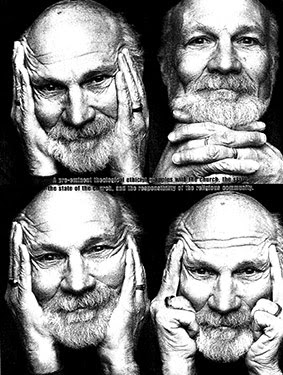Editor's Note: In this interview, my friend Andrew Klager asks Stan Hauerwas for his theological response to the unfolding events and violence in the Middle East and the reaction of Christians in the West. The full interview can be found HERE.
Klager: The Middle East is becoming more of a mess as the weeks go by and is hemorrhaging in places such as Syria, northern Iraq, Israel-Palestine, and in many respects still also in Egypt. So, how does your theology -- your theological reflections, or the way you do theology -- guide your reaction to the complex mix of religious, political, and economic reasons for this instability? Or, more simply, what does your theology say about how we should respond to the chaos and violence in the Middle East?
Hauerwas: Who's the "we"? -- I'm not going to do United States foreign policy, so the "we," I take it to be "we" Christians who find ourselves with very unhappy alternatives, which means we need to make all the friends we can get. And that, I think, would be extremely important for Christians to simply be present in these contexts in a way that we can have some idea of what in the hell is going on, because I think that to really know what's going on is very hard to discern. And that means -- I mean, I'm really attracted to the work that Christian Peacemaker Teams do, who go to Hebron and get between Palestinians and Israelis and say, "can we fix you guys a meal?" I mean, that's at least starting to help people discover one another's humanity, and if you don't do that, I think that any kind of long-term solution is quite hopeless.
Klager: For better of worse, there are a variety of initiatives that could be implemented to address the violence in pockets of the Middle East -- including military action, political negotiation and diplomacy, humanitarian assistance, and grassroots conflict transformation and peacebuilding. What are a few of the key theological considerations that you'd underscore to others in an attempt to convince them to support nonviolence and a just peace rather than violent, dehumanizing approaches?
Hauerwas: Well, I think that fundamental is the presumption that as followers of Christ we do not assume that we are going to rule the world. Rather, we assume that God has given us time in a world with deep injustice to do the kinds of things that are necessary for the recognition of the dignity of the enemy, and how that recognition can lead to reconciliation. And it takes time; ... God becametime with Christ, which means that we have all the time in the world to do what's necessary.
Klager: What are some of the most toxic theological ideas that you see as especially encouraging the support of violence and imperialism in reaction to the instability in the Middle East, for which healthier theological alternatives should be posed instead?
Hauerwas: That if we don't do something, things will go to hell in a handbasket -- and where the "we," to assumed meaning the American "we" -- and that is often underwritten by certain kinds of Evangelical theology that assumes that Israel, as a modern state, really is still the promised people. Now, I believe that Jews are the promised people, but I don't believe that that necessarily finds expression in the state of Israel, and I find some of that kind of rhetoric extremely toxic.
Klager: What do you say to -- or what have you found causes the most positive cognitive dissonance when said to -- those Christians who promote a militaristic "solution" to the many conflicts in the Middle East?
Hauerwas: How attention to the cross helps us see that God would rather suffer our violence than to do violence, and that in the cross, therefore, we find what it means to be a follower of Christ to the extent that we don't reproduce the violence that killed him.
Klager: Loving one's enemies is hard. As you've famously admitted before, "I'm a pacifist because I'm a violent son of a bitch."

